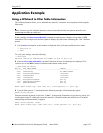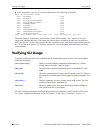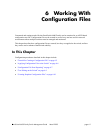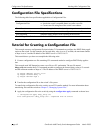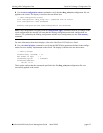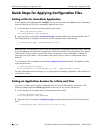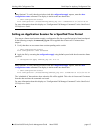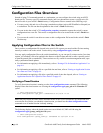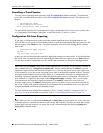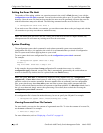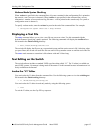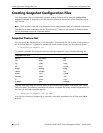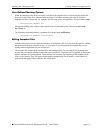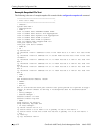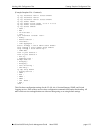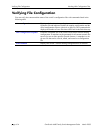
Working With Configuration Files Configuration Files Overview
OmniSwitch 6600 Family Switch Management Guide March 2005 page 6-7
Cancelling a Timed Session
You may cancel a pending timed session by using the configuration cancel command. To confirm that
your timer session has been cancelled, use the show configuration status command. The following will
display.
-> configuration cancel
-> show configuration status
File configuration: none scheduled
For more details about the CLI commands used to apply configuration files or to use timer sessions, refer
to “Configuration File Manager Commands” in the OmniSwitch CLI Reference Guide.
Configuration File Error Reporting
If you apply a configuration file to the switch that contains significant errors, the application may not
work. In this case, the switch will indicate the number of errors detected and print the errors into a text file
that will appear in the /flash directory. The following display will result where the cfg_txt file contains
three errors.
-> configuration apply cfg_file
Errors: 3
Log file name: cfg_txt.1.err
In this case, the error message indicates that the application attempt was unsuccessful. It also indicates that
the switch wrote log messages into a file named cfg_txt.1.err which now appears in your /flash directory.
To view the contents of a generated error file, use the view command. For example, view cfg_txt.1.err.
Note. The keyword, authkey, along with a related alpha-numeric text string, are automatically included in
many snapshot files (e.g., configuration snapshot all). The text string following the authkey keyword
represents a login password that has been encrypted twice. (The first encryption occurs when a password
is first created by a user; the second encryption occurs when a configuration snapshot is taken.) This dual
encryption further enhances switch security. However, it is important to note that any configuration file
(including a generated snapshot) that includes this dual-encrypted password information will result in an
error whenever it is applied to the switch via the configuration apply command. This is a valid switch
function and does not represent a significant problem. If an authkey-related error is the only error
detected, simply remove all authkey-related syntax using a text editor. If a new password is required for
the switch, include valid password syntax in the configuration file or immediately issue a new password
using the password command at the command prompt.
For more information on configuration snapshots, refer to “Creating Snapshot Configuration Files” on
page 6-10. For more information on passwords, refer to “User-Configured Password” on page 7-8.
Note. When you enter a command using debug set or debug show keyword syntax, the switch writes the
command output to a separate file that also ends with the .err extension. This does not mean that a config-
uration apply error has occurred; it is merely the switch’s standard method for displaying debug set or
debug show command output.



